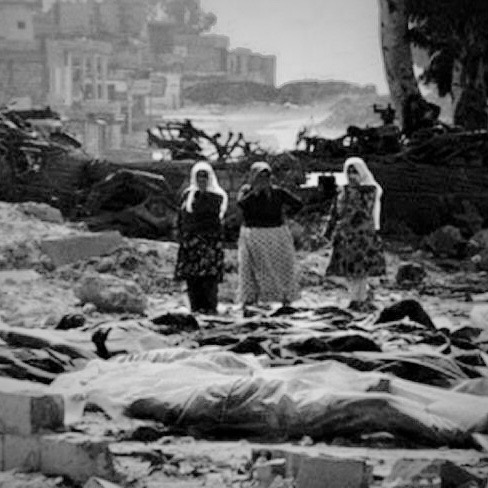On this day in 1948, a couple of hundred armed Zionist militias from the pre-1948 Irgun and Stern gangs stormed the village of Deir Yassin, a few kilometers to the west of Jerusalem, and committed one of the earliest massacres that became standard practice for the newly-founded state of Israel.
On April 9, 1948, Zionist gangs raided the village of Deir Yassin, killing at least 254 Palestinian civilians, mainly women, children and the elderly. There were documented cases of rape, mutilation and humiliation.
The Deir Yassin massacre was led by Menachem Begin in his capacity as head of the Irgun terrorist militia, which were also responsible for several acts of terror, including the blowing up of the King David Hotel in Jerusalem. Supporting the Irgun was the Haganah, a group that went on to form the basis for the Israeli army, and the Lehi, led by Yitzhak Shamir.
As news of the atrocities in the village spread, thousands of Palestinians fled their villages in fear. Eventually, some 700,000 Palestinians fled or be were forcibly displaced at the outset of Israel’s creation, making the massacre a decisive moment in Palestinian history.
Deir Yassin was a peaceful village whose less than 1,000 residents lived quite a relaxed life, with a degree of economic prosperity. The village was famous for its limestone cutting business. But all that peaceful life turned upside down after the massacre, in which 250 and 350 local Palestinian residents were massacred. The majority of the victims of the massacre were women, children and the elderly.
After being taken prisoner, many villagers were paraded through Jerusalem’s Old City by the militias in order to widely publicize their “victory” in Deir Yassin. In several other Palestinian villages, Nakba survivors reportedly fled after hearing about the massacre in Deir Yassin, fearing similar violence.
Others who survived, fearful and terrified, left their homes and properties to seek shelter elsewhere. They became just another number in the still ongoing uprooting of Palestinians from their homes. No one has ever been held accountable for the Deir Yassin massacre.
Zionist propaganda even tried to dispute the fact that the massacre of Deir Yassin ever took place. However, that painful and shameful fact is now beyond any historical doubt, just like other infamous world massacres, such as the My Lai massacre committed by the US military in South Vietnam in 1968.
Daniel A. McGowan, a Jewish journalist in Jerusalem, who witnessed the massacre unfolding, has written that all reports about the massacre were “direct, fresh and convincing”. However, many extremist Zionists “still refuse to believe it.”
Nathan Friedman-Yellin, a criminal himself, found the Deir Yassin massacre to be “inhumane.” He was a joint commander of the Jewish Stern Gang in 1948, yet he could not swallow his colleagues’ actions.
A member of the UK delegation to the United Nations (UN), in a letter dated 20 April, 1948, confirmed the attack on Deir Yassin in which “250 Arab men, women and children” were killed in “circumstances of great savagery”. Palestine, at the time, was a UK Mandate territory pending final status determination by the UN.
Of nearly 70 massacres during the 1948 Nakba, Deir Yassin would become one of those atrocities where almost all the acts of war criminality were unleashed: killing, destruction, pillaging, rape, and displacement.
Deir Yassin is a powerful symbol of Palestinian dispossession, as well as a historical fact Israel must confront when retelling its national narrative.
Israeli historians and Israeli society have been able to admit to the massacre in Deir Yassin by attributing it to the right-wing group Irgun, but have covered up or denied other massacres – notably the one in Tantura in 1948 – carried out by the Haganah, the main Jewish militia from which the current-day Israeli military has evolved.

